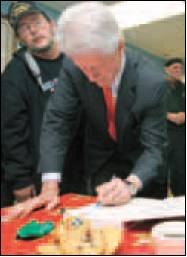Army Times
Shortages could be hurting Army health care
By Laura Ungar - Gannett News Service
Posted : Saturday Jan 12, 2008 7:52:09 EST
Injured in a roadside blast in Iraq, Sgt. Gerald Cassidy was assigned to a new medical unit at Fort Knox, Ky., devoted to healing the wounds of war.
But instead of getting better, the brain-injured soldier from Westfield, Ind., was found dead in his barracks on Sept. 21. Preliminary reports show he may have been unconscious for days and dead for hours before someone checked on him.
Sen. Evan Bayh, D-Ind., linked his death in part to inadequate staffing at the medical unit. Only about half of the positions in the unit were filled when Cassidy died. The Army is investigating the death and its cause, and three people have lost their jobs.
“By all indications, the enemy could not kill him, but our own government did,” Bayh told the Senate Armed Services Committee. “Not intentionally, to be sure, but the end result apparently was the same.”
As more wounded soldiers return from war, critics say staff shortages and turnover have affected the quality of health care at Army posts across the nation.
Overall, the Army’s Medical Corps has downsized significantly since the Persian Gulf War in the 1990s, dropping from 5,400 to 4,300 physicians and from 4,600 to 3,400 nurses.
According to the Department of Defense, more than 29,000 service members have been wounded in action in Iraq or Afghanistan in the last six years, compared with fewer than 500 in Operation Desert Storm.
Warrior Transition Units, created after media reports of substandard outpatient care at Walter Reed Army Medical Center in Washington, D.C., have struggled to find enough doctors, nurses and squad leaders to serve a growing number of patients.
Bayh pointed to a September report from the Government Accountability Office showing that more than half of the Warrior Transition Units nationwide had shortages in key positions.
By December, however, the Army had filled 90 percent of WTU positions, said spokeswoman Anne Edgecomb.
The Defense Department allocated about $1.4 billion in operations, maintenance and construction funds for unit facilities and projects.
Late last year, Congress passed legislation requiring the Defense Department and Veterans Affairs to develop a policy on improving care for the wounded. Army officials said they already are doing better, noting that Warrior Transition Units are approaching or meeting staffing goals across the nation.
“We’ve progressed quite well” on those units, said Brig. Gen. Michael S. Tucker, assistant surgeon general for Warrior Care and Transition. “We’ve done it while we’re at war and really strapped.”
But some positions have been filled with workers temporarily borrowed from other areas of the military, and critics say that as more soldiers return, the need for doctors and nurses will grow.
Meanwhile, officials said, Army hospitals need more workers now. Fort Knox’s Ireland Army Medical Center is struggling to fill more than 100 vacancies. It also lacks certain specialists, including neurologists who treat traumatic brain injuries, which are frequent in the soldiers hurt in the Iraq war.
“It would be very generous to say we’re at the proper staff,” said Constance Shaffery, public affairs officer at Fort Knox. “We are not at the staffing levels we want.”
SEE ALSO: Nurse shortage
Monday, January 14, 2008
Are shortages of medical personnel causing problems
Subscribe to:
Post Comments (Atom)

No comments:
Post a Comment